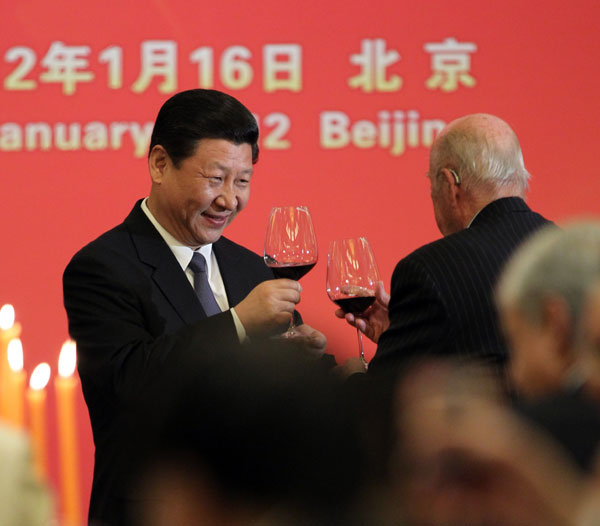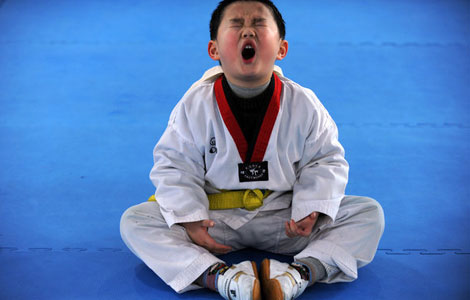|
|||||||||||
Vice-President marks Nixon trip with vision of future ties
BEIJING - The United States should view China's strategic intentions in an objective way and ensure that disputes between the two countries do not harm ties, Vice-President Xi Jinping said on Monday, ahead of a key visit to the US.
|
 |
|
Vice-President Xi Jinping proposes a toast during a banquet after a gathering in Beijing of officials, scholars and diplomats commemorating 40 years since Richard Nixon made his historic trip to China in 1972. Wu Zhiyi / China Daily |
Recognizing differences in history and culture, Xi said that it was normal for the two countries to encounter disputes and friction.
"We hope that the US can view China's strategic intentions and development path in a sensible and objective way, and be committed to developing a cooperative partnership," Xi said.
"Ultimate caution should be given to major and sensitive issues that concern each country's core interests to avoid any distraction and setbacks in China-US relations," Xi said.
"By no means can we let relations again suffer major disruption," Xi told a meeting in Beijing.
Xi also said that the two countries should follow the spirit of the three joint communiques signed between China and the US to ensure that bilateral relations develop in a steady and smooth manner.
"No matter what changes might take place in the international situation, our commitment to developing the Sino-US partnership should never waver for temporary development," Xi told a meeting commemorating 40 years since US president Richard Nixon made his historic visit to China in 1972.
That visit changed the world's political landscape.
Addressing the gathering of academics, officials and senior diplomats who had been involved in the 1972 visit, Xi confirmed he will soon visit the US at the invitation of Vice-President Joe Biden.
"I will soon visit the United States at the invitation of Vice-President Biden, and I hope that my visit can play a positive role in advancing the Sino-US partnership," Xi said.
He didn't give details on the date of his trip, but it is widely expected to take place in February.
Xi's 20-minute speech touched on every aspect of China-US ties, from bilateral to multilateral cooperation, from politics to trade.
Trade between the two countries exceeded $400 billion in 2011 compared with $2.5 billion in the 1980s.
Xi also emphasized that China and the US should cooperate more closely to defuse international crises and enhance coordination over regional hotspots. They should also strive to encourage the stability and prosperity of the Asia-Pacific region.
Ties between China and the US, the world's two largest economies, have become a key factor influencing global affairs, but they still suffer occasional setbacks.
The US has repeatedly complained about its trade deficit with China. Many US politicians said China has artificially kept the value of its currency low to boost exports.
Yet even though the value of the yuan has gained more than 25 percent against the dollar in recent years, the US trade deficit has increased.
China has consistently made its opposition clear to the US selling arms to Taiwan, which is a part of China.
Sino-American tensions were heightened in recent years by US strategic re-engagement in the Asia-Pacific region, especially in the South China Sea, where China and some countries have overlapping claims.
Tension could be further heightened this year by the US presidential race, when the candidates tend to play the China card to win more votes.
For instance Mitt Romney, the leading Republican presidential hopeful, has targeted China several times in public comments and says he will take immediate action if elected.
Henry Kissinger, Nixon's national security adviser in 1972, who also attended the Monday meeting, said that although the election campaign will hear different voices, it will not change the general trend of China-US ties moving forward.
Analyst said Xi's impending visit to the US is of huge significance for bilateral ties.
Xi's visit, at a time when mutual trust is wavering, is important, said Niu Xinchun, a researcher on US studies with the China Institutes of Contemporary International Relations.
"From the second half of 2011, the US took action to reaffirm its influence in Asia-Pacific region, which provoked suspicion within China about US intentions," Niu said.
"At the same time, the US is doubtful of China's intentions for its rapid development. That's why Xi said the US should evaluate China's strategic intention objectively," Niu said.
The meeting is expected to go beyond the bilateral level to discuss the nuclear issues of the Korean Peninsula and Iran, according to Niu.
Ding Yuanhong, who participated in Nixon's historic visit and became China's ambassador to the European Union, said that although the two countries have basic differences, the future for their relationship is bright if they take a strategic view.
"Just concentrating on narrow issues will not help either country," he said.
Hot Topics
Kim Jong-il, Mengniu, train crash probe, Vaclav Havel, New Year, coast guard death, Internet security, Mekong River, Strait of Hormuz, economic work conference
Editor's Picks

|

|

|

|

|

|






